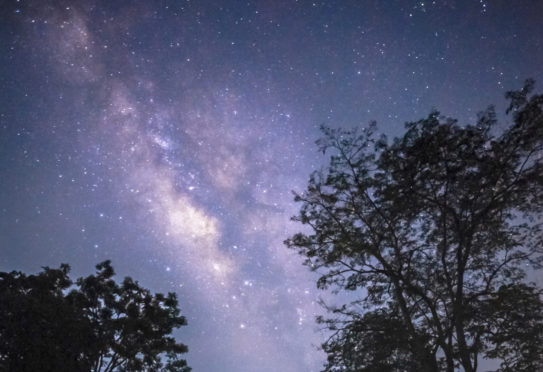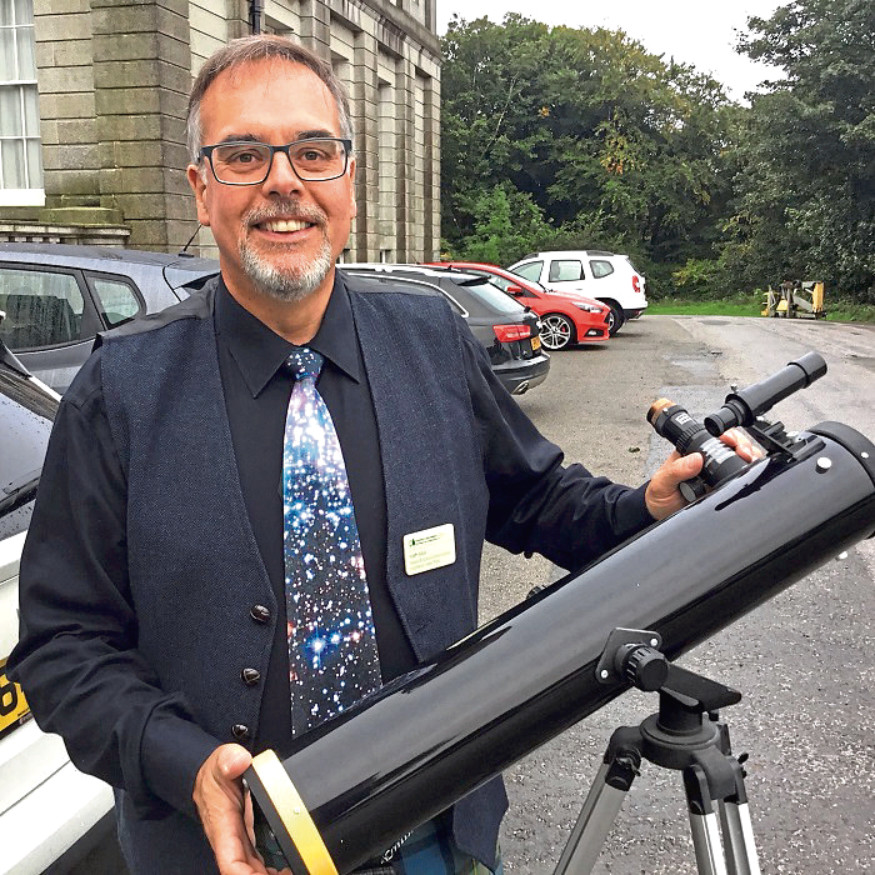
In a world of perpetual light, Keith Muir says it’s time to allow a little darkness into our lives.
Keith is the man behind Scotland’s first Dark Sky Park at Galloway Forest, which celebrates its 10th anniversary this year.
In that time it has become a major tourist attraction and boasts skies 38 times darker than cities, with the chance to see more than 7,000 stars within the park. But the wondrous stargazing, according to Keith, is simply “the icing on the cake”.
At the forefront of his mind when establishing the Dark Sky Park was combating light pollution and improving our physical and mental wellbeing.
“We have to bear in mind that lighting is a modern thing,” said Keith, Dark Sky Specialist for Forest Enterprise Scotland.
“We have been here for a short space of time and we’ve covered the planet in light. Our bodies aren’t used to that artificial light.
“There are only around eight generations of people who have lived in artificial light.
“The body produces protective enzymes in the dark, but very few people have blackout blinds. We’re not getting a good night’s sleep.
“Darkness is when you can’t see your hand in front of your face.
“Our use of modern gadgets in bed, like phones and laptops, means we end up more alert.
“Darkness can be our friend, it can help our health and mental wellbeing.”
Galloway Forest Dark Sky Park was the fifth of its kind in the world and the first outside of America when it opened in 2009.
There are three visitor centres, alongside independent businesses and self-employed Dark Sky Rangers, and the park brings between £600,000 and £1m into the economy each year thanks to tourism.
The idea of Galloway Forest becoming Europe’s first Dark Sky Park was mooted in 2007 when Steve Owens, co-ordinator of the International Year of Astronomy, asked Keith if he was interested in becoming a partner.
“It was a no-brainer,” Keith smiled. “We were intrinsically dark to begin with and already had astronomy events.”
Keith, who yesterday gave a talk about the first decade of the Dark Sky Park at nearby Wigtown’s Big Bang Festival, said he wanted to see more Dark Sky Parks open around the country.
The Tomintoul & Glenlivet – Cairngorms Dark Sky Park recently became the second one in Scotland, while Moffat is an official Dark Sky Town and Coll is a Dark Sky Island.
“It would be great if more opened in Scotland,” said Keith.
“We’re not worried about somewhere like the Cairngorms Dark Sky Park taking anything away from us.
“They have seen the benefits of what we have done and want to tap into that, they are learning from us. If we get the whole country going down that avenue of realising more light isn’t good light, then the health benefits which come with that will make it better for everyone.
“The Central Belt is awful for light pollution, even though streetlights are being changed to LEDs.
“While these lights require less power and the bulbs last 60,000 hours compared to 6,000 with the old ones, they produce light on the blue spectrum which is not good for us.
“I can pick up light readings from Belfast, Glasgow and the Lake District here.
“Lighting is now a key part of the planning process across Dumfries and Galloway and Ayrshire.
“All it takes is a big farm or an industrial site to put up new lighting and we would have a big problem on our hands.”
The Sky Quality Meter System measures the amount of light entering a specific area.
“A level of 1 is the sun and 25 is the equivalent of being inside a black bag in a black room in the middle of the Atlantic Ocean,” explained Keith. “A major city will be in the region of 16, while our readings are 21. With every point you go up it is 10 times darker.
“The other night it was beautiful and clear, no moon in the sky and there were stars shining all around.
“When you see reflections on the roof of the car and on the loch, you know it’s very dark. The Milky Way was above my head, from horizon to horizon.
“I encourage people to come out and take a look. The longer you stay out, the more you will see and all you need is a pair of binoculars.”
He added: “I’m passionate about this and I believe in protecting the night-time environment and what we can learn from the night sky.
“When you see an image of Earth from Saturn, we are no more than a tiny blue speck.
“Every living thing that’s existed is on that tiny blue dot, so should we not be looking after it a little better?”

Enjoy the convenience of having The Sunday Post delivered as a digital ePaper straight to your smartphone, tablet or computer.
Subscribe for only £5.49 a month and enjoy all the benefits of the printed paper as a digital replica.
Subscribe